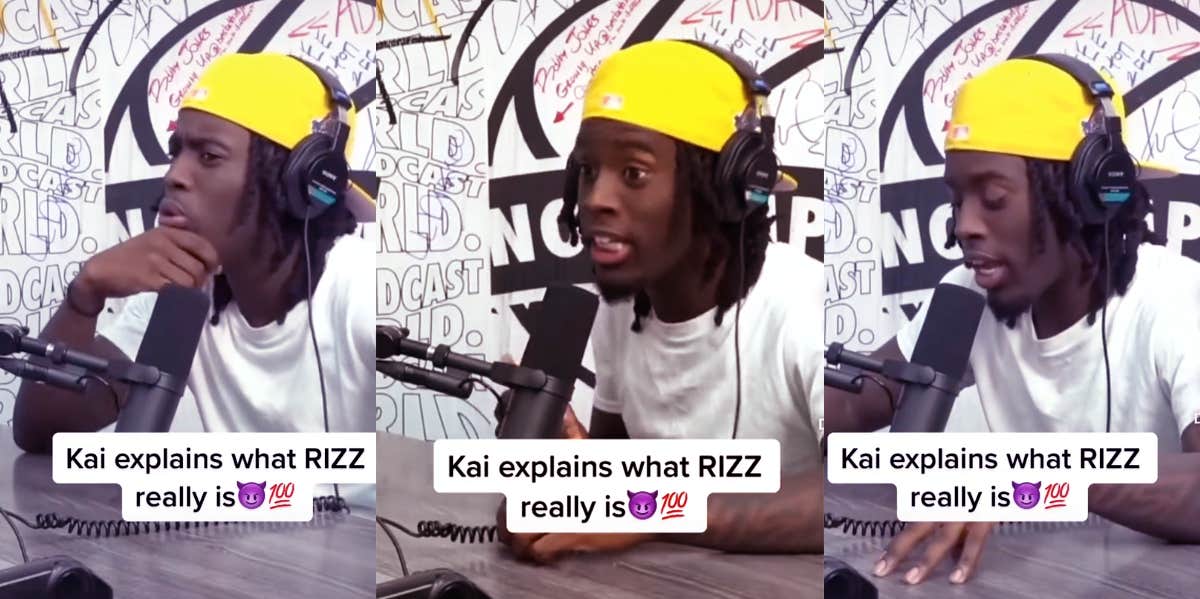The Origins & Meaning Of 'Rizz' — Why Using The Slang Term Is More Harmful Than You Realize
What do Tik Tok users mean when they say someone has “rizz”?
 Tik Tok
Tik Tok Rizz is Gen Z's latest slang term that is taking the internet — namely TikTok — by storm but what does it mean and where did it come from?
What does 'rizz' mean?
Rizz is a slang term for skill in seducing or flirting with a potential romantic partner.
'Rizz' comes from the word 'charisma' and refers to someone's 'game' or flirting prowess.
When someone “has rizz” or “rizzed someone up” it means they’re smooth-talking their way into a person’s heart.
The skill can go even further than words, though, as “unspoken rizz” describes a person so charismatic, so on top of their game, that they don’t even need to sweet talk to win someone over.
The term has been credited to Youtuber and Twitch Streamer Kai Cenat, who has been using the term on his streams for years, and posted a video defining it for his audience in late 2022.
Since the end of 2022, the usage of “rizz” has skyrocketed on Twitter, Tik Tok, and other social medias, and some Tik Tok users are pointing out a sinister trend with the term.
Where did the word 'rizz' originate?
“Rizz” isn’t just a clever, trendy term that Cenat coined in a vacuum, the word is actually a part of African American Vernacular English, or AAVE for short, historically known as Ebonics.
AAVE is the unique dialect often spoken by Black Americans. According to news reporter Sydnee Thompson: “AAVE consists of both singular phrases and unique grammatical structures that make it comparable to the language spoken by the Gullah Geechee in the Carolinas, Florida, and Georgia, the Creole from Haiti, and the patois spoken in countries such as Barbados and Jamaica”.
She describes the dialect as a “living language”, evolving and serving as an important piece of Black culture within the U.S.
However, due to social media, AAVE has rapidly become accessible to non-Black communities, and now tons of nuanced, community-centered terms are quickly being brought into the public eye as quirky, trendy catchphrases.
The process of stealing words from their original context and stripping them of their meaning is exploitative and appropriative, without question, and the seemingly endless trend of white social media users picking up new AAVE terms and then denouncing them as “cringe” once they get tired of them hurts those fighting to have their language taken seriously as it deserves to be.
So how can you minimize harm with the words you use on social media?
For starters, getting educated! When encountering a new word on Tik Tok or Twitter, give it a Google!
Understanding the original cultural context of a word can help prevent it from being used in inaccurate, or even offensive contexts that it wasn’t meant for.
Thompson explains it perfectly: “By making the effort to uncover something’s origins, we make a strong statement: Black culture is not deserving of mockery or appropriation — it demands respect.”
“And we show respect to Black culture when we choose to spend time searching social media or the wider internet before drawing conclusions about cultural content we are unfamiliar with.”
Then, after becoming educated on the history and vibrance of the words, it is important to be conscious of how you use them. Don’t fill your sentences with appropriated AAVE terminology just to sound “funny” or “trendy”, doing so devalues the language, and is plain disrespectful.
Be meaningful with the words you choose, and respectful to their origins.
Finally, listen to Black creators! There are hundreds of creators (like @khalilgreene from the TikTok video above) across social media dedicated to educating people on Black history, culture, linguistics, and much more. Listen to the information they have to share, and believe them when they describe harmful trends and subtle forms of racism. We all have a lot to learn, and there’s no shame in recognizing that!
The world is more connected now than ever before, and when the people around us speak, we have a responsibility to listen to them.
Hawthorn Martin is a news and entertainment writer living in Texas. They focus on social justice, pop culture, and human interest stories.

